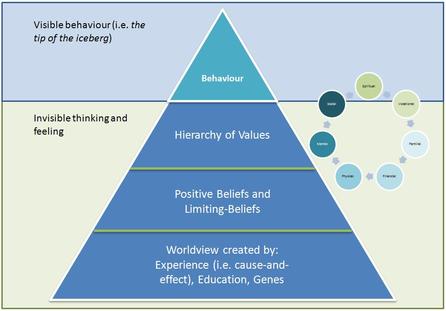 We all have but control over one thing, our minds. Everything we are and do starts with our mind. Our minds all operate on a default level, a kind of default setting to life in general. This level affect how we interpret and approach life. For instance, we can all acknowledge that we know some people that have a positive outlook on life and some a negative. Well, that outlook is a result of that person's consciousness level. I assume we would all like to be happy (at least if you are reading this I know you would like to). We all want to live lives of peace, love, and joy. If we acknowledge that everything we are and achieve in life starts in our minds, and furthermore that we only have control over one thing, i.e. our minds, then I would say that to get our minds default setting, our level of consciousness, right is a good place to start the journey to happiness. While all of us can try to live consciously every day, without knowing your current level of consciousness we cannot make actionable plans on moving up the critical framework for conscious living. Having clarity of the different levels of consciousness provides us with the full context of growth. By knowing the other levels ahead, we are more able to comprehend how limiting our current level of consciousness is, what we should be striving towards and the highest end point we can reach. Furthermore, each level of consciousness (LOC) coincides with determinable human behaviors and perceptions about life and people. These levels determine the reason why people behave the way they do. These levels can be divided into positive energy-giving levels and negative energy-taking levels. The negative levels from the lowest to the highest are: shame, guilt, apathy, grief, fear, desire, anger, pride. The positive levels are: courage, neutrality, willingness, acceptance, reason, love, joy, peace, enlightenment. Although there may be times when we function at different levels of consciousness, we in general operate at one particular level. This can be considered our core level. Understanding these different levels will hopefully inspire you to move beyond your current state. ShameAccording to David Hawkins, this is one step above death. At this level, the primary emotion one feels is humiliation. It’s not surprising that this level, being so close to death, is where most thoughts of suicide are found. Those who suffer from sexual abuse are often found here, and without therapy they tend to remain here. GuiltNot too far from shame is the level of guilt. When one is stuck in this level, feelings of worthlessness and an inability to forgive oneself are common. ApathyThe level of hopelessness and despair; this is the common consciousness found among those who are homeless or living in poverty. At this level, one has abdicated themselves to their current situation and feels numb to life around them. GriefMany of us have felt this at times of tragedy in our lives. However, having this as your primary level of consciousness, you live a life of constant regret and remorse. This is the level where you feel all your opportunities have passed you by. You ultimately feel you are a failure. FearPeople living under dictatorship rule or those involved in an abusive relationship find themselves at this level. There is a sense of paranoia here, where you think everyone is out to get you. Suspicion and defensiveness are common. DesireDesire is a major motivator for much of our society. Although desire can be an impetus for change, the downside is that it leads to enslavement to ones appetites. This is the level of addiction to such things as sex, money, prestige, or power. AngerAs one moves out of Apathy to Grief and then out of Fear, they begin to want. Desire which is not fulfilled leads to frustration which brings us to Anger. This anger can cause us to move out of this level or keep us here. PrideAccording to Hawkins, since the majority of people are below this point, this is the level that most people aspire to. It makes up a good deal of Hollywood. In comparison to Shame and Guilt, one begins to feel positive here. However, it’s a false positive. It’s dependent upon external conditions such as wealth, position or power. It is also the source of racism, nationalism, and religious fanaticism. CourageThis is the level of empowerment. It is the first level where you are not taking life energy from those around you. Courage is where you see that you don’t need to be tossed to and fro by your external conditions. This empowerment leads you to the realization that you are a steward unto yourself, and that you alone are in charge of your own growth and success. This is what makes you inherently human: the realization that there is a gap between stimulus and response and that you have the potential to choose how to respond. NeutralityNeutrality is the level of flexibility. To be neutral, you are, for the most part, unattached to outcomes. At this level, you are satisfied with your current life situation and tend not to have a lot of motivation towards self improvement or excellence in your career. You realize the possibilities but don’t make the sacrifices required to reach a higher level. WillingnessThose people around you that are perpetual optimists - this is their level of consciousness. Seeing life as one big possibility is the cornerstone of those operating here. No longer are you satisfied with complacency - you strive to do your best at whatever task you’ve undertaken. You begin to develop self-discipline and willpower and learn the importance of sticking to a task till the end. AcceptanceIf Courage is the realization that you are the source of your life’s experiences, then it is here where you become the creator of them. Combined with the skills learned in the Willingness phase, you begin to awaken your potential through action. Here’s where you begin to set and achieve goals and to actively push yourself beyond your previous limitations. Up to this point you’ve been generally reactive to what life throws at you. Here’s where you turn that around, take control, and become proactive. ReasonThe level of science, medicine, and a desire for knowledge. Your thirst for knowledge becomes insatiable. You don’t waste time in activities that do not provide educational value. You begin to categorize all of life and its experiences into proofs, postulates, and theories. The failure of this level is you cannot seem to separate the subjective from the objective, and because of that, you tend to miss the point. You fail to see the forest because you’re tunnel-visioned on the trees. Paradoxically, Reason can become a stumbling block for further progressions of consciousness. LoveOnly if, in the level of Reason you start to see yourself as a potential for the greater good of mankind, will you have enough power to enter here. Here is where you start applying what was learned in your reasoning and you let the heart take over rather than the mind - you live by intuition. This is the level of charity - a selfless love that has no desire except for the welfare of those around them. Ghandi and Mother Theresa are examples of people who were living at this level. Only 0.4 percent of the world will ever reach it. JoyThis is the level of saints and advanced spiritual people. As love becomes more unconditional, there follows a constant accompaniment of true happiness. No personal tragedy or world event could ever shake someone living at this level of consciousness. They seem to inspire and lift all those who come in contact with them. Your life is now in complete harmony with the will of Divinity and the fruits of that harmony are expressed in your joy. PeacePeace is achieved after a life of complete surrender to the Creator. It is where you have transcended all and have entered that place that Hawkins calls illumination. Here, a stillness and silence of mind is achieved, allowing for constant revelation. Only 1 in 10 million (that’s .00001 percent) people will arrive at this level. EnlightenmentThis is the highest level of human consciousness where one has become like God. Many see this as Christ, Buddha, or Krishna. These are those who have influenced all of mankind. Hawkins’ Power vs. Force and his associated map of consciousness has been a groundbreaking work for those interested in human-consciousness development. In this continuum we can clearly see where we as individuals function and where we can arrive. A view into what could be our potential is inspiring. It’s interesting to note that according to Hawkins, everything that is around us can effect our level of consciousness: the music we listen to, the people with whom we associate, the books we read, the shows that we watch, etc. Understanding the continuum you will begin to see yourself and those around your in a different light. You will likely feel more compassion for others. We are all at different levels of consciousness and are functioning according to the light and knowledge that we've obtained. This will help you to better understand what drives people and why they make specific choices. How can you raise your own level of consciousness? I would suggest first to figure out where you presently are - awareness is always the first step. Learn from the Great Ones who are the source of the ‘wisdom literature’ of your tradition and try to live the principles taught in those books. As you raise your own level, you will discover a desire to help others and you’ll be a source of positive change for yourself and the world. Fear requires special attention. The proliferation of fears is as limitless as the human imagination; once Fear is one's focus, the endless fearful events of the world feed it Fear becomes obsessive and may take any form: fear of loss of relationship leads to jealousy and a chronically high stress level. So too does fear of cash flow shortages lead to vulnerability and a chronically high stress level. Fearful thinking can balloon into paranoia or generate neurotic defensive structures and, because it is contagious, become a dominant social trend inside an organisation. Fear limits growth of the personality and leads to inhibition. Because it takes energy to rise above Fear, the oppressed are unable to reach a higher level unaided. Thus, the fearful seek strong leaders who appear to have conquered their fear to lead them out of its slavery. We must also realize that much of the remainder of the world's population, civilized as well as primitive, lives primarily in Fear; the majority of humans spend their lives in a quest for one form or another of security. Those whose lifestyles transcend the imperative of survival to allow discretionary options become grist for the Desire-driven world economic mill, and success in attainment of desires leads at best to Pride. Within the levels of consciousness, the higher frequencies are extremely powerful, and few people routinely experience these as pure states because they are masked by lower energy fields of anxiety, fear, anger, resentment, etc. Rarely does the average person get to experience, for instance, love without fear, or pure joy, much less ecstasy. But these higher states are so powerful that once experienced, they are never forgotten and are sought ever after. Few people know what it is to live without fear. But beyond fear lies joy, as the meaning and purpose of existence become transparent. Once this realization occurs, life becomes effortless and the sources of suffering dissolve; suffering is only the price we pay for our attachments. Following Socrates’ approach and examining our lives we can find that most of our fears have been based on falsehood. The displacement of the false by the true is the essence of the healing of all things visible and invisible. These falsehoods are also called limiting beliefs and we should continuously challenge our own, and other peoples', limiting beliefs. By examining these beliefs and removing the ones that don’t serve us we can free ourselves from fear and elevate ourselves to higher consciousness levels. How do you know whether your level of consciousness operate below the line? Ask yourself the following simple questions to form an idea of your current consciousness level: - Do you judge?
- Do you punish?
- Are you forceful?
- Are you loosing energy?
- Do you blame?
- Do you abdicate?
- Do you regret?
- Do you hate?
- Do you demand?
I would like to challenge you to identify your consciousness level and to set yourself a target. Pick a level you would like to operate at and start doing it today! Be Extraordinary!Myles
 Many people ask me how they can more effectively stay focused on their goals. It is possible that my answer to their question could also serve you. So I'd like to share with you some of my insights into human behavior and some of my reasons why you will either achieve or not achieve the goals you may set.
You have one or more areas of your life that you value and desire to have more fulfillment in (see post Knowing Yourself - Identify your Hierarchy of Values below). And you desire to fulfill that which is most meaningful, most important in your life. When you are very young that may be fulfilling the mastery of a video game. When you are a teenager, it may be looking as attractive as you can because you want to get attention. In your 20's it may be your relationships, in your 30s your job or a career and in your 40s vitality and wealth.
You and everyone else have voids that want to be filled. The word 'fulfillment' means to filling full the mind that is perceiving this void. So anything that you think is not filled, or that you perceive is incomplete or not whole, you want to fill. If you don't have money, you search for money. If you don't have a relationship, you search for a relationship. Whatever it is you are looking for, whatever you think is missing most; you are unconsciously or consciously moving towards and taking actions towards and making decisions to get your void filled. Your fulfillment in life is directly proportionate to how well you fulfill your voids and values. If you feel you are, you feel grateful for life. If you feel you are not, you feel ungrateful.
Any time you minimize yourself and subordinate yourself to other people, you will tend to inject their set of values into your life and take them on as if they were your own values. You will then in turn sacrifice what is truly important to you according to your own higher values and attempt to be somebody you are not. Your true higher values then go unconscious and the injected 'new' values that you will now try to live by become your conscious values. Whenever there is a conflict between the conscious and the unconscious, the unconscious wins which means that although consciously you think your values are x, you still live according to your true unconscious values because that is what determines how you see the world, make decisions in the world and act upon the world (see post Knowing Yourself - Valuing Yourself, Improve your Self-Worth below). So you now end up with a moral dilemma with an internal conflict striving to be the way you think you are supposed to be but still making decisions and living according to your own higher values. Then you wonder why it is that you can't stay focused on the things you think you are supposed to be doing and you will hear yourself saying "I should do this", "I ought to be like that", etc.
When you have an expectation to fulfill an outcome that doesn't match your true higher values, you will end up with anger, aggression, blame, feelings of betrayal, criticism and challenge towards yourself. These ABC's of negativity towards yourself occurs when you have unrealistic expectations and you set goals that don't match your true higher values. For example, if you say you want to exercise and you find out that physical empowerment is right at the bottom of your hierarchy of values, then you are basically setting a goal that doesn't match who you are. It is a fantasy and a delusion and it is guaranteed to create a self-sabotaging feeling inside of you because although you will consciously say that you want to exercise, but you will unconsciously keep going back to what is truly more important to you. It is not fun to hear the truth sometimes because you may like the dopamine fix of living in the unrealistic expectation or fantasy.
Every time you set a goal that doesn't match your higher values you will need outside motivation to keep you working towards it. And if you don't have that motivation from the outside you will probably stop doing it and go back to your real true higher values. If you expect yourself to fulfill the goal and you keep not doing it then you are not going to feel great about yourself. You are going to feel like you are not a master of your destiny.
When you think you're a failure, what's actually going on is that you're being tested to see if you're setting goals that are congruent with your higher values. If you're not really committed to a goal due to incongruency your goal and your higher value, you'll let the perception of failure stop you from going forward. Labels called "failure," and for that matter, "success," are nothing but feedback systems to make sure that you're authentic with your objectives and that they're congruent with your highest values. It makes sure that you're not exaggerating or minimizing your goals and that you get clear on your true objectives.
You will most likely achieve your goals once you set goals that are congruent with your true higher values. When you do greater achievement occurs. Nobody has to get you up in the morning to achieve when you do. So take the time to see what is truly highest on your list of values and start setting your goal to match this. When you do you will endure the many pains and pleasures in your pursuit of it because it is something you can't wait to do. And if you can't wait to get up in the morning and achieve your goal, then you won't let any obstacle in the way, stop you from it.
Because you are unique, you are only truly in competition with others when you are not being true to yourself. The moment you are your true self, there will feel as if there is no true competition and you will shine. May you achieve your many goals and dreams!
Be Extraordinary!
Myles
 Martha Beck categorizes sources of change into three simple classes: change due to shock, change as a result of opportunity and transition, and change from growth. The inability to adapt to change in our environment creates stress. This inability to adapt is not really a result of what happens to us, but rather how we perceive it. Therefore, the quality of our lives are determined not as much by what happens to us, but rather how we perceive it. Our perception about changes in turn is determined by the quality of the internal (and sometimes external) questions we ask about it, i.e. how we make sense of it, e.g. why is this happening to me? What did I do to deserve this? etc. We could rather focus on empowering questions like how dies this serve me, how could I be thankful for this? etc.
Be Extraordinary!
Myles
 In my previous post I discussed what fear is and discussed one approach to deal with fear. I would however like to clarify and further discuss the seventh fear, i.e. fear created by the negative influence from other people. I mentioned in the previous post that people who don’t value themselves, i.e. poor self-worth and poor self-esteem, find it hard not to open their minds to what everyone thinks of them. This is simply because these people don’t believe they have any value and therefore rely on the opinion of other people, or everyone else, to determine their value. This behaviour, which is a normal human trait, can thus be defined as: opening their minds to the opinions of other people. Let me just state here that we all exhibit this behaviour at one time or another, we all have fluctuating self-esteems. Very few people don't ever pay attention, and inherit, the opinions of other people simply because we were all trained to do so - every day sitting in school we were trained to open our minds to the teachings, opinions, etc. of other people. OK, now let's start by examining this everyone I have mentioned.
We all have this everyone, or what psychologists term the generalized other, but in fact this everyone is composed of just a few key people. Martha Beck says that our social nature makes us long to fit in with a larger group, but it’s difficult to hold the tastes and opinions of more than five or six individuals in our mind. So the resourceful thinking mind creates a kind of shorthand: it picks up a few people’s attitudes, emblazons them on your brain, and extrapolates this image until it covers the entire known universe. This is your personal generalised other and please don’t feel bad about it, I assure you we all have one or more of these groups.
We now know that our generalised other typically consist of the tastes and opinions of a small number of people. The people we choose to put into this small group are the people who had the biggest effect or influence on our lives, good or bad. Unfortunately, herein lies a dilemma for the people who do not value themselves, i.e. people with a poor sense-of-self or self-worth. Let's stop and focus on self-worth for a moment to understand why.
Our self-worth starts to develop from the time our subconscious mind starts recognizing our existence. I guess the exact timing is different for everyone but it happens while we are still in our mothers' womb. We are all born with a forming or partial sense of self-worth based on the experiences in the womb. This is reinforced, during the first year or two of our existence, by our experiences with the people around us - our parents, care givers, etc. The way in which these people fulfill our needs (i.e. care for us) has a major impact on the formation of our self-worth. These people all help us to form an opinion about ourselves and these experiences help us to place a value upon ourselves - a value we will believe to be true for the rest of our lives. Simple little things like how they respond to your demands or needs, or hearing 'you are a good girl' or 'you are a bad girl' vs. 'that is a good thing' or 'that is a bad thing' helps the infant to shape her sense of self. Over time, due to repeated experience, we start to believe that we are a good person who deserves good things (e.g. when our demands are met often and consistent) or we start to believe that we are a bad person who deserves bad things (e.g. when our demands are not met often and on a consistent basis). It is true what they say: words (and actions) have the power to create or destroy.
 I have included an illustration to help explain how self-worth effects our behaviour. As mentioned above, our world view (lowest level in the pyramid, i.e. the base, or basis, of our behaviour) is created primarily from our experience of the world, but also from our genes inherited, enculturation, etc. As we experience more and more things, as we start to understand more about human interaction, what is good or bad vs. whether I am good or bad (as the example above illustrates) we start forming beliefs and making rules about how the world fits together and how to best function in the world (this is the second lowest level in the pyramid). These beliefs, right or wrong, become ingrained in us and are mostly automatically executed by our subconscious minds without even a rational thought applied to it. Our sense of self-preservation drives us to try and perfect our functioning in the world to the best of our abilities irrespective of how right or wrong the beliefs or rules might be that help us achieve this. I should note here that beliefs are classified into two major groups - beliefs that serve you and limiting beliefs that don't serve you, but which help or helped you to function in the world. Without going into detail here, the third level of the pyramid is our hierarchy of values, which is underpinned and formed by our beliefs, limiting-beliefs, and worldview. Finally we get to the visible part, our behaviour. All of our behaviour, in this case opening our minds to the opinions of other people, is underpinned by the elements of the pyramid below us. What's more, our own behaviour and that of others, constantly adjust or add to our world view, which alters our beliefs and limiting beliefs, which alters our hierarchy of value, and which is then reflected in our behaviour once again. So the person with a poor sense of self could surely simply change their beliefs about themselves and stop paying as much attention to the opinions of others? The catch is that it's not that simple. Our mind will find ways of holding or maintaining our beliefs, irrespective of how limiting they are, simply because it has been able to preserve us to this point so it is likely to continue doing so. So the question is: how do start valuing ourselves more? Here are some pointers: - You start by simply understanding your opinion and attitude toward yourself by listening to your language when you talk about yourself and paying attention to the thoughts you have about yourself. If it happens that you're putting yourself down, belittling your worth, and making light of your talents in the face of others, then you will come across as low in self-esteem. This isn't humility, it's self-denial and an attempt to lessen your presence.
- Learn to overcome a fear of self-love. Self-love is often equated with narcissism or egotism. However, healthy self love is about being your own best friend. Its about treating yourself with the same care, tolerance, generosity, and compassion as you would treat a special friend.
- Trust your own feelings. Self-worth requires that you learn to listen to and rely upon your own feelings and not automatically respond to the feelings of other people.
- Analyze yourself and challenge your limiting beliefs by applying some common sense to them.
- Stop making your self worth conditional on other peoples opinions and tastes. Remember that people change their minds about everything. Basing your value to the opinion of someone or everyone else disempowers you. It places you in a very volatile position and you should be aware that your value is likely to fluctuate constantly from highly valuable to worthless simply because they changed their minds. Avoid overlaying how you think other people see you.
- Tell and prove to yourself that you matter by accepting the responsibility for your circumstances, focusing your energy on what you need to do to change your situation or your circumstances, don't blame other people and avoid being a martyr, and work on your resilience. Resilient people have the emotional strength to get through life's difficulties without falling apart. This isn't about belittling the hardships and challenges of life – they are still very real – but it is about how you react and work your way through them. You always have a choice between demeaning yourself or always remembering your self-worth and staying firm in that resolve. Also, by taking time for yourself, doing things that matter to you and taking care of yourself, you demonstrate to yourself that you value you.
- Carry on believing in your self-worth even when you think you can't. Break the habit of trying to please everyone all of the time. Trying to keep everyone happy will leave you empty and disappointed and it will displease some people. Live in the present. The past has its lessons from which you've learned but it's long gone, so leave it behind you. Keep a notebook of your achievements. Every time you feel tempted to put yourself down and to bemoan that you're getting nowhere, make a cup of coffee, sit down comfortably and take out this book and read through it. Compete only with yourself, not with others! Express your feelings instead of bottling them up.
I hope this post will help you see that you are worth your weight in gold and that you can overcome the fear created by the negative influence from other people by valuing your own opinion about yourself.
The past doesn’t exist except as a memory, a mental story,
and though past events aren’t changeable, your stories
about them are. You can act now to transform the way you
tell the story of your past, ultimately making it a stalwart
protector of your future. Be Extraordinary!
Myles
 I touched on the topic of fear and worry in my previous post. I mentioned that fear is good in the context of what it is supposed to do - keep us alive. Fear does an excellent job of keeping us alive, but constant fear and worry can paralyze us and keep us from our right life and from reaching our fullest potential.
Fear is a state of mind, a negative emotional response to a perceived threat. It leads to an urge to either confront the threat (typical fight response), to flee from it (typical flight response), or often just freeze (or paralysis) in the face of the threat. Fear is one of a few basic, or innate, emotions and almost always relates to future events, such as worsening of a situation, or continuation of a situation that is unacceptable.
In our modern society our fears are often irrational or delusional fears, which are not responses to legitimate threats, but instead are triggered by our perceptions, misinformation, past traumas or status anxiety, i.e. an anxiety about what others think of us; about whether we're judged a success or a failure, a winner or a loser. However, there are more realistic fears we all deal with at some point. In my previous post I mention 6 basic fears, and a seventh that is inherited from other people. Understanding these fears, recognizing them as 'limiting beliefs', and approaching them with acceptance, willingness and reason, allows us to disarm them and deal with them. Next we consider how to deal with fear.
Our first step is to recognize that the indecision to deal with fear creates anxiousness and constant anxiousness leads to worry. Therefore, fear becomes translated into a state of worry through indecision and we thus need a strategy, i.e. make some decisions, relating to each of the basic fears. Let's review each of them briefly and some of the choices we can make.
Fear of loss of money or poverty. First, accept you are in control of your life (i.e. internal locus of control). Second, accept that you are responsible for accumulating as much money or wealth as possible without worry. Third, decide to get along with the wealth you are capable of accumulating, i.e. live within your means.
Fear of shame and criticism. First, don't succumb to status anxiety. Secondly, choose an 'everyone else' or 'other people' (i.e. the different groups of 'people' you compare yourself against often created only in your mind and not based on any factual information or actual people) that will serve you. In other words, choose the 'everyone else' or 'someone else' or 'no one else' who’s opinion will matter to you, don’t simply assume or imagine what these groups of people think of you.
Fear of illness and loss of life quality and function. Choose to forget any symptoms you might experience. Don't focus on every ache or pain in your body and expect the worst. Choose to accept the natural aging of your body.
Fear of loss of love or someone. Master the fear of loss of love by focusing on areas in your life where love exists in different forms. Choose secondly to give love rather than expect love. By giving love you will be rewarded with love (love begets love), in many different forms.
Fear of old age. Choose to accept old age not as a handicap, but choose to see it as a new season in one’s life filled with wisdom, self-control, and understanding not known to youth. Choose to see it as an opportunity to contribute back to society.
Fear of death. This is our biggest and most real fear. Here I would like to quote Steve Jobs. He said a while before his passing: "remembering that I'll be dead soon is the most important tool I've ever encountered to help me make the big choices in life. Because almost everything - all external expectations, all pride, all fear of embarrassment or failure - these things just fall away in the face of death, leaving only what is truly important." He also said "remembering that you are going to die is the best way I know to avoid the trap of thinking you have something to lose. You are already naked. There is no reason not to follow your heart." The truth is that no one wants to die. Even people who want to go to heaven don't want to die to get there and yet death is the destination we all share. No one has ever escaped it. And that is as it should be, because death is very likely the single best invention of life. It is life's change agent.
We can all stop the habit of worry by accepting responsibility for yourself and everything in your life, and realize that nothing that life has to offer is worth the price of worry. With this choice will come calmness which will lead to happiness, which in turn allows us to see fear as opportunity, the start of something, and not the end we perceive it to be.
A quick word on the seventh fear, i.e. fear created by the negative influence from other people. We all think of ourselves, at different times, as both 'good' and 'bad', 'smart' and 'dumb', etc. Furthermore, we all pick up on what other people are thinking of us, e.g. whether we are 'good' or 'bad'. Therefore, we often perceive ourselves as 'good' or 'bad' based on what we think other people think of us. From this it is clear that choosing to allow certain people into your life can greatly benefit you or it can cause your downfall. If you happen to open your mind to the destructive thoughts of other people, then you are at the mercy of these people. Protecting yourself against negative influences is very simple, think and act for yourself. Don't leave your mind open to the negative influences of other people. I realize this choice is a lot easier for people who classify themselves as secure and very difficult for people who are anxious or insecure. In a next post I will discuss how you can discover our inner value and become more secure in yourself.
I believe this post will help you take control of your fears by deciding to accept them for what they are, take decisions that will serve you, and acknowledge yourself as the master of your fate, the captain of your destiny. I believe this will inspire you to strive toward your legacy each day no matter what your circumstances may be.
Be extraordinary!
Myles
 One of the keys to knowing yourself is to understand your hierarchy of values. This useful information helps you really know what is important to you, or even better, helps you tell other people what is really important to you. True leaders don’t think in terms of what ‘should’ be significant based on culture or upbringing, but what ‘ is’ actually essential and fulfilling. Although it is easy to understand your own hierarchy of values, and that of other people, most people have no idea what’s really important to them. Being consciously aware of your worldview, belief system, and values simplifies many aspects of your life. You understand your behaviour better, become a more integrated person and you can comfortably expand your perspective, and you even find it easier to appreciate and accept other people, simply by knowing what’s important to you. If you truly know yourself, your purpose and mission becomes less puzzling, less variable and more stable. That’s because a large part of your purpose is revealed in your hierarchy of values. Understanding your own hierarchy of values, and those of others, helps you create caring, fulfilling, long lasting relationships. It helps you to communicate in a way that links your ideals and values with others’. This, in turn, helps you develop, maintain and enrich your relationships. We each have a unique set, or hierarchy, of values. Your core beliefs (unfortunately also including your limiting beliefs) and values (and specifically their ranking) influence how you perceive and how you act in your world, business, home, community, etc. Therefore, they determine the results you achieve in life, your behaviour, and ultimately, the course of your life. Your beliefs and values will also express themselves in all the areas of your life: spiritual, vocational, mental, familial, financial, social, and physical. It happens that people allow fears, or limiting beliefs, to keep them from living according to their true hierarchy of values. This causes stress, emptiness and a general sense of lacking. Let’s briefly focus on fear because it can be so limiting. We all fear something at some point in our lives. There are many ways to define fear, but one approach is that fear as an emotion’s main task is to protect us and keep us alive. Fear does an excellent job of keeping us alive, but can do us a lot of harm if not properly managed. As noble as this function is it is a subtle enemy. Fears sometimes remain hidden in the subconscious where they remain hidden and can be very difficult to eliminate. According to Napoleon Hill there are six basic fears, with some combination, that every human suffers at some time or another. The first six are self-created whereas the last, not a basic fear, is inherited from other people: - Fear of loss of money or poverty
- Fear of shame and criticism
- Fear of illness and loss of life quality and function
- Fear of loss of love or someone
- Fear of old age
- Fear of death
- Fear created by negative influence from other people
Fear, however, is a state of mind. People who conquer fear know that they have absolute control over only one thing, their minds. Therefore, they choose to control their minds, and not be controlled by their minds. This choice empowers them to master their fears. Worry, on the other hand, is a state of mind based upon fear. It is a form of sustained fear caused by indecision, i.e. the indecision to deal with the fears. Because it is a state of mind you can control it (because you choose to control your mind). This indecision creates anxiousness and constant anxiousness leads to worry. Therefore, the six basic fears become translated into a state of worry through this indecision. I might spend some time dealing with fear in a future post. I return to conclude the discussion on identifying your hierarchy of values. You can identify the priority of your value system by answering the following simple questions: - How do you fill your space?
- How do you spend your time?
- How do you spend your energy?
- How do you spend your money?
- Where are you most organised?
- Where are you most disciplined?
- What do you think about?
- What do you visualize?
- What do you talk to yourself about?
- What to you speak about with others?
- What do you react to?
- Where are you willing to ensure pain to succeed?
Once you have identified your key values you can prioritise them. This is your hierarchy of values. Once you have your hierarchy you will become aware that you act according to what is highest in your hierarchy and neglect the things lower in your hierarchy. In the next post I will discuss how knowing your, and other peoples’, hierarchy can help you be happier in yourself as well as cultivate better relationships. Be extraordinary!Myles
 I simply love this quote by Steve Job's:
“Your time is limited, so don’t waste it living someone else’s life. Don’t be trapped by dogma — which is living with the results of other people’s thinking. Don’t let the noise of others’ opinions drown out your own inner voice. And most important, have the courage to follow your heart and intuition. They somehow already know what you truly want to become. Everything else is secondary."
This encapsulates a lot of what I believe and apply every day by trying to follow my curiosity and intuition. Doing this generally turns out to be priceless later on. How can you do it? Simply stay foolish and stay hungry!
Be extraordinary!
Myles
 Leadership in the workplace, where we all spend (or invest) most of our time, is critical. Whether you are a leader or manager in a business or someone working for a 'boss', I believe you will find this post informative. How do we define leadership in business? Is it different from leadership in general? The short answer is no. Leadership in the workplace is simply a combination of general leadership qualities and skills (as in my previous post) and sound business practices and approaches. Whether you are a leader or someone aspiring to be one, you can follow the steps below, each working with the other, toward the perfect management environment. Step one is to pick the right business. Not all businesses are created equal. The first step to leadership success is to own, manage, or work for the right business with the right economics working in its favour. This is how you get ahead from the start. Warren Buffet says that when a leader with an good reputation meets a business with a reputation for poor economics, it is usually the business’s reputation that remains intact. Therefore, when you are selling your most valuable, and rapidly depreciating, asset - your time - make sure you pick a company that will appreciate it in return while supporting you in reaching your dreams, potential and purpose. You want to be inspired and do what you love every day. So how do you pick the right company? You pick it just like someone planning to invest hard earned money would. In other words, you pick a company that is economically successful. See my Value Investment Blog posts to understand my thinking regarding how you achieve this. Step two is to pick the right people for the job. If you are not a manager then you can add these ideas to the previous point, i.e. pick the right business, because they will help you pick the right environment to work in. Finding the right people requires looking for integrity, intelligence, energy, and someone who loves the business (a passion for the business). Warren Buffett warns that without integrity someone's intelligence and energy will kill you (figuratively). John Demartini says that finding the right person for the job is all about finding the person who's values match the job description. When a potential employees' values match the job description, they will be self disciplined, focused, reliable, enthusiastic and productive in their position. Your greatest ally in picking the right people for the job is conversation. Through conversation you can understand the person's passions and dreams. If the person's dreams and long term goals match that of both the job and the company you have a winner. Ask the person how the job would fulfill their values and how the vision of the company would fulfill their dreams. Step three is to delegate authority to the point of abdication. Delegation of authority is a requirement for many reasons, one being for your own sanity. Managing too many tasks will lead to too many balls in the air, and if you drop one, you drop them all. The second most important reason is to allow your people to run things in order for them to achieve. Your managers can focus on just one job and thus achieve mastery and success performing that job. Empowering them will leave them with a sense of pride and achievement which will make them happy, enthusiastic, inspired employees. Step four is to motivate your workforce. Once the excellent business is found, the right management is in place, and you have delegated authority, you have to start motivating your people to be all that they can be, so that the business, the manager, and the employees can be as productive as possible. If there is a single skill that a manager should be great at, it is motivating others to achieve. There are a number of tenets that will serve you well toward motivating others: - Motivate people through leading by example. Provide people with a reputation and example to live up to and ensure that you serve your people. A serving leader is someone that focuses on their team rather than power, domination, or self-interest.
- Praise people for their achievements all the time. From the smallest to the biggest achievement, ensure that you praise people and ensure you do so on a grand scale.
- Be careful to criticize. Warren Buffett calls it: praise by name, criticize the category. When you have to criticize make sure that you criticize the category, not the person. And if ever you have to criticize a person be sure to precede the criticism with praise first.
- Don't try and win arguments. The wise leader knows that to win an argument you have to loose and argument.
- Encourage people to come up with solutions and ideas. When people have the opportunity to solve a problem, to rescue the situation, it motivates them to greatness and it will energize them for a long time to come.
- Be supportive of other peoples unique hierarchy of values. Don't try and force your wants and needs on other people. Take the time to understand theirs and support them in it. If its important to them it should be important to you. Support them and they will support you.
- Allow people to make mistakes, don't you make mistakes? Admit it, we all make mistakes so why would you not allow your employees to make mistakes. Mistakes can result from a lack of understanding, a lack of training, a lack of equipment, a lack of motivation, etc. These are all things that you can pay attention to and help resolve for your employees.
- Use the magic words please and thank you, they will take you beyond were you thought possible.
- Be patient and take time to motivate. Use the fire them up before you fire them out mentality to always take the time to motivate more.
Step five is to define a number of managerial axioms to serve you day to day. Over time we all develop a set of beliefs that serve us to achieve more and better things. Formalize your principles, write them down, print them out and stick them on your office wall. Some of these principles include: - Learning every day. Benjamin Franklin said that the school of life is in session every day, so learn as much as you can.
- Manage yourself for inflation. Stay ahead of the curve, keep increasing your value by training and expanding your thinking.
- Don't tolerate dishonesty. Dishonesty and negativity will poison your entire team.
- Remember that everyone has a mission, everyone has a purpose and help them achieve it. Peoples mission or purpose is an expression of their highest values or priorities. Identify what their hiearchy of values is, i.e. what is really important to them. Then help them set their goals and help them work congruent to that and watch how you automatically electrify and energize their lives.
- Communicate often about everything. Start by communicating your vision, your values, and how important people and their values are to the organisation. Don't stop communicating and praise while you communicate.
Success in business and in life go hand in hand. Improve either one of the two, or preferably both, will improve your life drastically. I hope this post will help you improve your life management skills.
To lead people, walk beside them ... As for the best leaders, the people do not notice their existence. The next best, the people honor and praise. The next, the people fear; and the next, the people hate ... When the best leader's work is done the people say, 'We did it ourselves!' — Lao-tsu Be Extraordinary!
Myles
 There are many elements or components to exceptional leaders. Different authors focus on different aspects. I believe all people are leaders in some way or another and could therefore benefit from understanding these elements. I believe there are 5 key elements present in all exceptional leaders. They are:
Element #1: Know yourself - The most important element of any leader is to know yourself. Socrates’ two guiding principles were: Know Thyself and The unexamined life is not worth living. The ancient Greeks considered the principle of Know Thyself so important that this inscription was found to be one of three on the Temple of Apollo at Delphi. The Greeks understood that knowing yourself creates the platform from which personal growth and development starts. Exceptional leaders understand that personal growth and development cannot be made or forced, but knowing themselves helps them improve themselves, guide their growth, and walk the path of excellence every day.
Element #2: Begin with your legacy - Legacies are the fruits of dreams. It can be said that dreams are the seedlings of reality, the seedlings of legacies. Our dreams of the future is a window on our innermost future desires for ourselves and everything around us. Some people dream of sending people to Mars, like Eon Musk from SpaceX, and some people dream about other important things like living a happy life. Some people, like exceptional leaders, dream about leaving behind a living legacy that contributes to the world even after they are gone. This legacy creates their purpose in life. Mix in a plan and some passion and you have a recipe for success.
Element #3: Lead by example and lead yourself first - each exceptional leader knows that it starts with them. They have to start by setting the example, by giving people something to look and live up to. They know that by their example they can guide, motivate and inspire people around them.
Element #4: Guide, motivate and inspire other people - The exceptional leader knows that his primary function is to guide, inspire and motivate, not to be the hero, the one that steals the limelight. The exceptional leader knows that if he is inspired and motivated he will be able to guide the people around him to transform toward excellence using inspiration and motivation. The exceptional leader is happy to step back and let his people get the praise for good performance and success.
Element #5: The 5% more rule - When planning or doing something, apply the discipline to do it 5% better. Exceptional leaders take 5% more time to make focused decisions to revolutionize their life, careers and selves. Exceptional leaders focus 5% more on catching the next opportunity to improve themselves and the world around them. The exceptional leader gets 5% more done because they focus 5%-more on doing. They don’t just focus on starting, nor do they focus just on the process, they focusing on completing. A 5% increase of finishing things transforms organizations and people from ordinary to excellence.
Beyond understanding these elements lies striving to realize these 5 elements in our lives. Great leaders don't just understand or own these elements, they claim them to the fullest. Make it an immediate goal to connect and claim these five elements because it will make you extraordinary.
Be extraordinary!
Myles Rennie
 Two little, yet powerful, words that can change your world. My mother always called please the magic word. Please is such a powerful word because it is an expression of respect toward other people. It shows that you value their time and energy and effort.
To respect all people and all things is the number one value I teach my boy's. It is a fact that if someone feels respected they feel valued and when you show a person how much you value them they will be willing to show, in return, how much they value you.
The second power-word is thanks. Thanks shows appreciation for the effort or time that someone had to expend to benefit you. It shows that you acknowledge them and again is shows that you value them. Always remember that both gratitude and respect begets gratitude and respect.
Valuing people and respecting them will foster good relations and strong bonds. The exceptional leader uses simple words like please and thank you to express this understanding. Be an exceptional leader and express your respect and gratitude toward other people and elevate and inspire them to greatness. The more respect and gratitude you give, the more respect and gratitude you give.
Be inspired!
Myles Rennie
|











 RSS Feed
RSS Feed